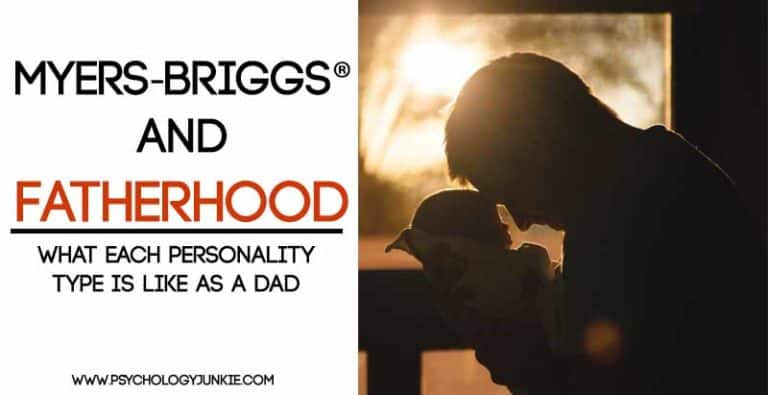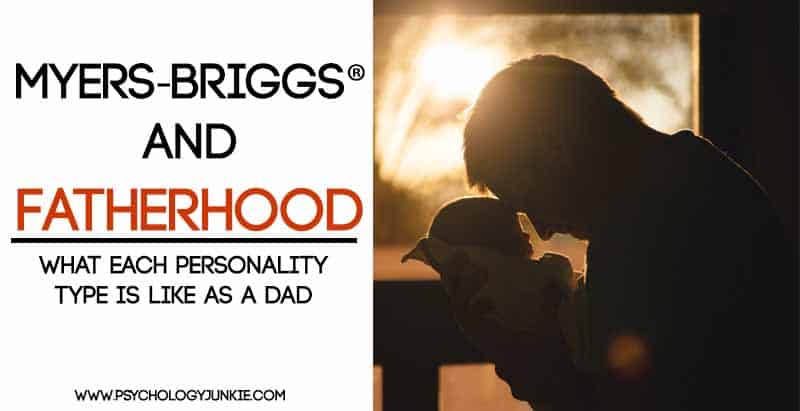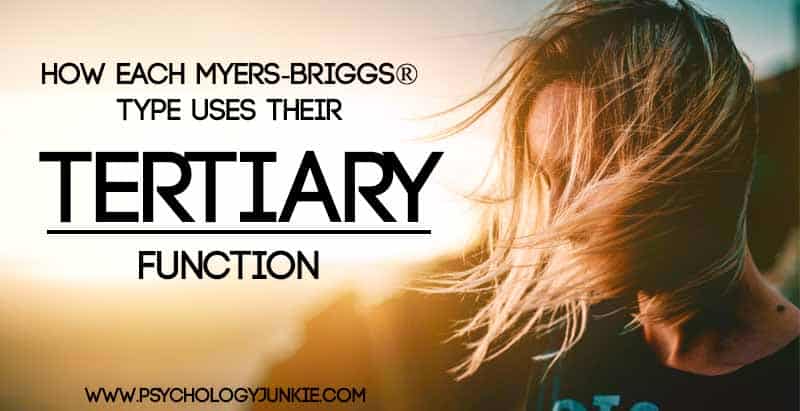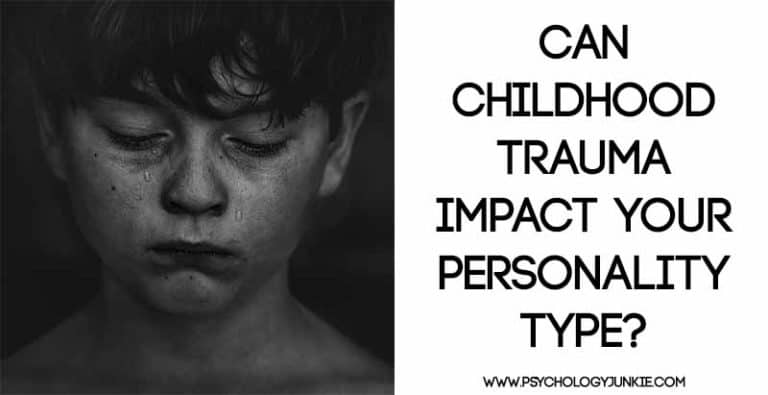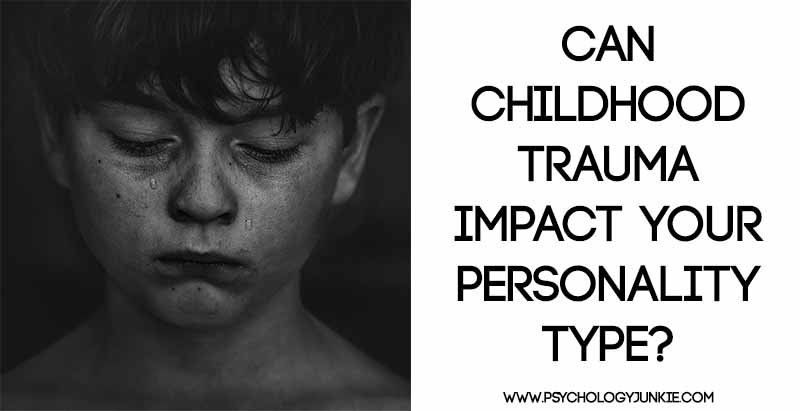The Enneagram 1 Child
Known as “The Perfectionists,” Enneagram Ones feel driven to improve the world and make the most of themselves. They want to be useful, to feel a sense of purpose, and live up to their own high standards. But there’s more to Ones than hyper-responsibility and high standards. Let’s take a look at their childhood strengths and struggles to get a deeper understanding of what they are like!
Not sure what your Enneatype is? Take our free Enneagram questionnaire.

Table of contents
Estimated reading time: 7 minutes
An Overview of the One Enneagram Type:
- Part of the Body triad (along with Enneatypes 8 and 9)
- Can have a Two or a Nine wing (1w2 or 1w9)
- Vice: Anger
- Virtue: Serenity
- Integrates to the Seven (the Enthusiast) under growth
- Disintegrates to the Four (the Individualist) under stress
- Basic Fear: Being evil, corrupt, or defective.
- Basic Desire: To be righteous and have integrity.
Signs That Your Child Might Be an Enneagram One Type:
- They are unusually irritable when they make a mistake
- They want to know what the rules are
- They take their responsibilities seriously
- They do their chores without having to be reminded
- They naturally take charge and try to control things
- They have no qualms telling people when they’re wrong
- They are interested in causes, ideals, and missions
- They take their schoolwork seriously
- They are serious and no-nonsense
- They are inspired by grace under pressure and people with strong moral compasses
- They dislike laziness or procrastination
Strengths of the Enneagram One Child:
Ones are visionary children with a mission to improve the world around them. They may be the first to sign up for a volunteer opportunity or the first to complete their chores when asked to. These children need to believe that they can make a difference, and setbacks that would make other types give up only spur them on harder. These children aren’t wishy-washy or weak-spirited. They are typically determined, responsible, and detail-oriented.
Ones believe in following the rules and staying level-headed and reasonable. In childhood, this can be a distinct advantage. Parents may feel rapture that their child is so responsible, then feel shocked when their hyper-responsible One chastises them for slacking off or being inconsistent. It’s not uncommon for parents of Ones to feel “parented” when they fail to live up to their One’s high standards.
Consistency is a crucial need of the One. They want a sensible, just upbringing where rules are given and enforced squarely to every child in the family (as well as modeled by the parents). If parents expect them to speak respectfully and then choose to speak disrespectfully to them or their siblings, the One will notice this inconsistency and be inwardly enraged.
As hard workers, Ones often have busy lives. They often fill their day with tasks pertaining to their mission and vision. They are likely to finish their homework as soon as they get home from school because they dislike putting things off until the last minute. Ones thrive when they have a schedule, a to-do list, and a sense of continuity and order in their lives.
Morality is a central focus of the One. More than anything, they want to have integrity and be “good.” This focus can be a positive thing in that Ones are less swayed by peer pressure than many other children. At the same time, the quest to be “good” can become a never-ending struggle for perfection that wears them down.
Struggles of the Enneagram One Child:
Because Ones are natural perfectionists, they often push themselves to overwhelming degrees of exhaustion. They are apt to bite off more than they can chew and take on an excessive number of responsibilities and tasks only to regret it later.
Ones feel a lot of instinctive anger at the injustice and disorder of the world around them. They try to restrain themselves from expressing their anger because they see it as “bad.” As a result, they hold in an enormous amount of tension through gritted teeth, clenched fists, and tightly-set jaws. Body tension, aches, and pains are very common for Ones, even in childhood. Instead of blowing up, they are more likely to appear critical, judgmental, or as if they know it all. This, in turn, can create more frustration as they encounter rifts in their relationships due to their critical nature. Ones deeply crave several loyal friends, but many are turned off by their sometimes disapproving, critical side. These same friends may also deeply appreciate the One’s integrity, dependability, and loyalty.
Ones often feel that in order to be loved they must be “good,” not only in their own eyes but in the eyes of others. As such, when they fail or make mistakes they worry that they are worthless or evil. They ruminate over their failures and condemn themselves for their faults. They also believe that others do the same. They feel a compulsion to bolster their sense of “goodness” through actions. They take on responsibilities, pick up the messes around them, and follow closely to their moral code. They may even brag about their accomplishments and tasks, trying to prove to the people around them that they are good, upstanding citizens. The truth is, they are often trying to convince themselves as much as they are trying to convince others. And, as an unfortunate result, others may find them as self-congratulatory and self-righteous.
The healthier the One is, the more accepting, open-minded, hopeful, and wise they will be. The unhealthier the One is, the more they will appear condemnatory, punitive, contradictory, and inflexible.
Tips for Raising a One Enneagram Type:
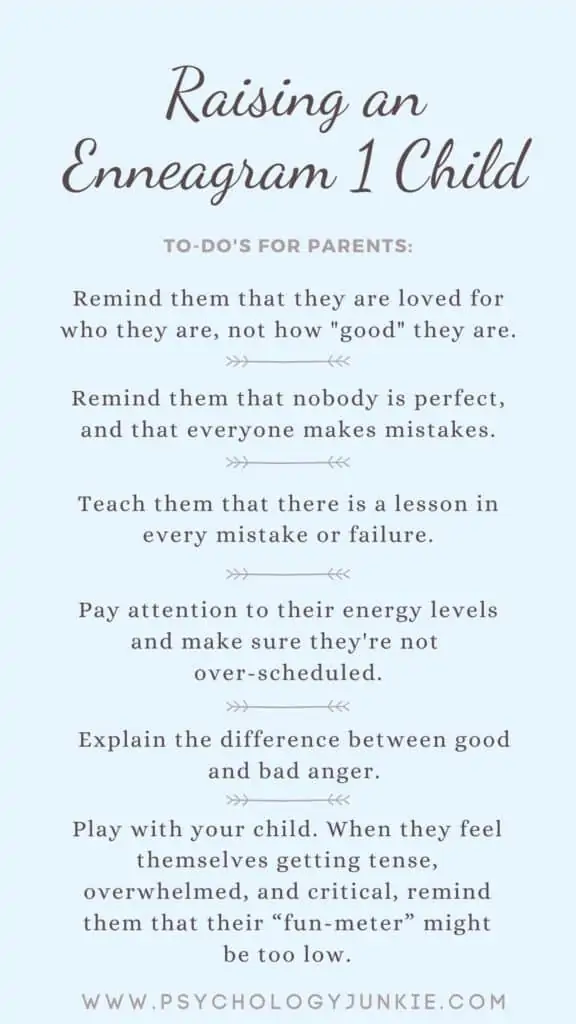
- Remind them that they are loved for who they are, not how “good” they are.
- Remind them that everyone makes mistakes and perfection is impossible to attain.
- When you see them getting frustrated over not meeting a high standard, ask them what is at stake, who they’re trying to please, and what the real outcome would be of not meeting perfection. Help them understand that “good enough” is sometimes the best option.
- Teach them about learning through failure. Teach them to see every mistake and failure as a learning experience and find joy in the process rather than spiral into self-condemnation. Give them examples of others who failed and later succeeded (you can find these stories in biographies, children’s books, and many religious texts).
- If you find your child becoming closed-minded and judgmental, practice perspective-shifting with them. Read them fictional stories and ask them to imagine what it would be like to be the different characters. Ask them to imagine what things could have caused different people to have different perspectives. Explain how everyone’s life experiences are different and each person has hundreds of little puzzle pieces that fit together to give them a totally unique perspective that nobody else can fully understand.
- Pay attention to their energy levels. Are they pushing themselves too hard? Are they not getting enough rest? Encourage them to take small breaks and make time for play. Make sure their schedules aren’t overly scheduled.
- If you see your One stifling their anger, take some time to pull them aside and let them “vent” to you. Explain to them that there is such a thing as good anger and bad anger, and help them to learn the difference.
- Help your children practice mindfulness techniques so that they can relax their bodies and stay present and positive. The book Mindfulness Games for Kids is an excellent resource that helps children to handle complex emotions and find peace and healthy coping mechanisms.
- Play with your child. Do spontaneous, fun activities now and then. Teach them the beauty of fun. Explain to them that when they take care of themselves, their hearts become filled with joy and energy that they can pour out into their missions. When they feel themselves getting tense, overwhelmed, and critical, remind them that their “fun-meter” might be too low.
Other Articles You Might Enjoy:
The Enneagram Type One – The Perfectionist Profile
21 Signs That You’re an Enneagram One Personality Type
10 Signs of an Unhealthy Enneagram One
Want to learn more about the Enneagram? Check out these books!
These links are affiliate links. This means if you purchase one of these eBooks I get a small commission that I can use to keep Psychology Junkie running smoothly.
Personality Types: Using the Enneagram for Self-Discovery

Subscribe to Our Newsletter

Want to discover more about personality type? Get the inside scoop with Susan Storm on all things typological, along with special subscriber freebies, and discounts on new eBooks and courses! Join our newsletter today!





